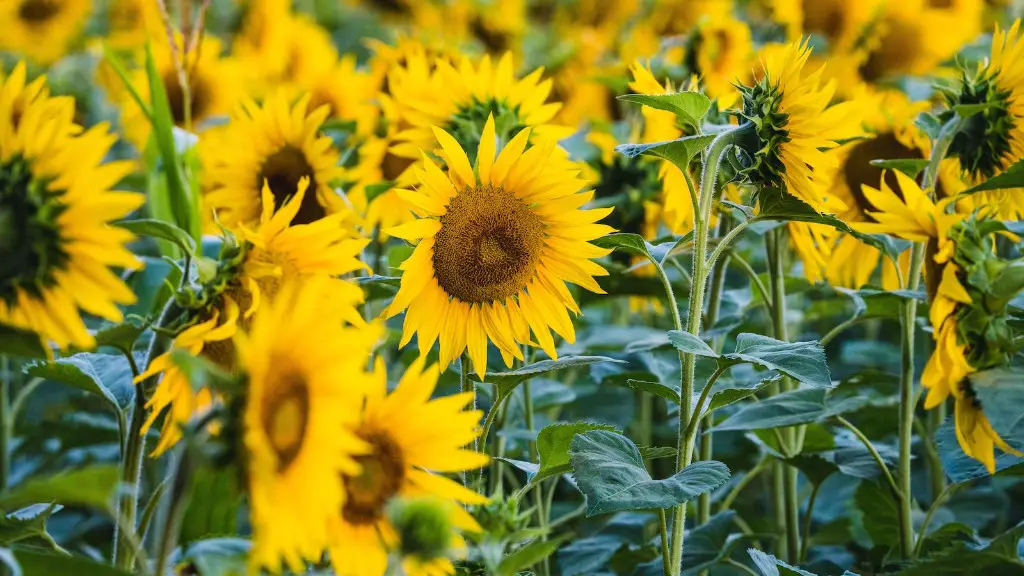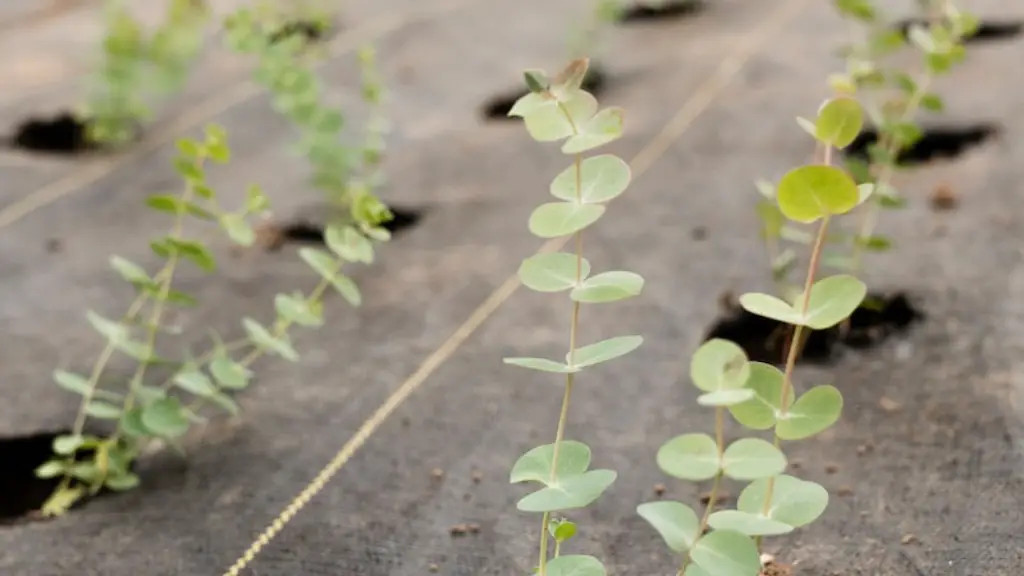Agriculture is an integral part of Florida’s economy. The state is well-known for its production of aquaculture, citrus fruits, tropical fruits, peanuts and sugar cane. In addition to these crops, the state is also known for its variety of livestock, including poultry, dairy, beef and swine.
Florida’s diverse climate makes it suitable for a wide range of agricultural activities. The northern part of the state is home to the citrus industry, while the southern region is ideal for growing tropical fruits, such as mangoes and papayas. The state also boasts numerous cattle and poultry farms, as well as several aquaculture operations.
In addition to the production of food and fiber, Florida’s agricultural sector also supports the state’s tourism industry. Agriculture-related activities, such as agritourism, bring in millions of dollars each year to Florida’s economy. Agritourism offers tourists an opportunity to connect with the rural lifestyle and learn more about Florida’s agricultural products and heritage.
Florida is also known for its advanced agricultural research, which aims to provide solutions for sustainable food production. Research is conducted at universities and research institutions, such as the citrus research and education center at the University of Florida, and the Center for Aquaculture and Biotechnology at the University of South Florida.
In addition to its research initiatives, Florida is also home to a number of organizations that promote and support the state’s agricultural sector. These include Agri-Florida, an initiative aimed at promoting the state’s agricultural growth and development, and the Florida Agricultural Statistics Service, which provides valuable data on the state’s agricultural production and related activities.
The state’s agricultural sector is also supported by a number of government subsidies and incentives, such as the Exemptions and Tax Incentives Scheme, which helps farmers reduce their costs by providing exemptions on production and administrative costs.
Aquaculture
Aquaculture is an important part of Florida’s agricultural economy. The state’s mild climate and large coastline makes it ideal for a range of aquaculture activities. Aquaculture operations typically involve the culture of shrimp, oysters, clams and other marine organisms in pond-like structures.
The state is also home to several aquaculture research centers, such as the Institute of Aquaculture Technology at the University of Florida which focuses on research and development of aquaculture and biotechnology. These research centers are using cutting-edge technologies and techniques to foster sustainable food production.
In addition to aquaculture, the state also has a number of commercial fishing operations that employ thousands of people and support the state’s tourism industry. Tourists who visit Florida can participate in a range of seafood-related activities, from fishing trips to the Gulf of Mexico to oyster bake festivals.
Citrus Fruits
Florida is renowned for its production of citrus fruits, such as oranges, grapefruit, lemons and limes. Florida is the largest producer of oranges in the US, producing 70 percent of the country’s oranges each year. In addition, Florida is also the top producer of grapefruit and tangerines.
Citrus fruits are an important export for the state, with nearly half of the citrus produced in Florida exported to markets worldwide. Florida’s citrus industry is supported by a number of government initiatives, such as the Florida Citrus Code, which establishes standards for the production and marketing of citrus fruits.
The state also provides a number of financial incentives to help citrus producers lower their costs. In addition, research institutions such as the citrus research and education center at the University of Florida are researching ways to improve yield, create resistance to diseases and reduce costs for the production of citrus fruits.
Tropical Fruits
Florida is well-known for its production of tropical fruits, such as mangoes, papayas and avocados. These fruits are grown throughout the state, particularly in the southern regions.
The state also has a number of initiatives to promote the development of tropical fruits. For example, the Tropical Fruit Research and Education Program aims to improve the production and marketing of tropical fruits in the state. In addition, the Florida Department of Agriculture and Consumer Services provides funding and technical assistance to support tropical fruit growers in the state.
Research institutions, such as the Center for Aquaculture and Biotechnology at the University of South Florida, are also researching ways to increase production and reduce cost for the production of tropical fruits.
Peanuts
Florida is also known for its production of peanuts. The state is the fifth-largest producer of peanuts in the US, producing more than 30,000 tons of peanuts each year.
The state’s peanut industry is supported by a number of government initiatives, such as the Peanut Checkoff Program, which provides funding and support for research and promotion of peanut production. The program also provides funding for research into pest and disease management.
In addition to government initiatives, Florida is home to a number of research institutions and non-profit organizations that are focused on peanut research and development. For example, the Florida Peanut Producers Association works to promote and strengthen the state’s peanut industry, and the National Peanut Research Laboratory at the University of Florida researches ways to improve peanut yields and reduce costs.
Sugar Cane
Florida is also renowned for its production of sugar cane. The state is the top producer of sugar cane in the US, producing more than 70 percent of the nation’s sugar cane each year.
Sugar cane production is supported by a number of government initiatives, such as the Florida Sugar Cane Extension Program, which provides funding and assistance for research, education and promotion of the state’s sugar cane industry. The program also works to increase the efficiency of sugar cane production and reduce costs.
In addition, the Florida Sugar Cane Science Program is researching ways to increase yields and reduce costs. Researchers at the program are working to improve pest and disease management and develop new varieties of sugar cane that are better suited to Florida’s climate.
Animal Husbandry
Animal husbandry is an important part of Florida’s agricultural sector. The state is home to a number of large-scale animal farms, including dairy, beef and swine production.
The state’s animal husbandry industry is supported by a number of government initiatives, such as the Animal Care Program, which provides funding for research, education and marketing activities. The program also provides grants to support animal health and welfare initiatives.
In addition, the Florida Animal Health and Production Research Institute is researching ways to improve animal husbandry, such as feed efficiency, animal handling and husbandry practices, and animal health and welfare. The institute is also researching ways to reduce the environmental impact of animal production.
Resource Management
Resource management is an important part of Florida’s agricultural sector. The state’s Water Management District provides water resource management and conservation services, while the Florida Department of Environmental Protection is responsible for protecting the state’s natural resources.
The state’s agricultural sector is also supported by a number of governmental initiatives, such as the Agricultural Best Management Practices (BMP) Program, which provides incentives and technical assistance to farmers to help them implement BMPs to reduce their environmental impact.
In addition, the Florida Department of Agriculture and Consumer Services works to promote innovation and new technologies to help farmers increase their productivity and reduce their environmental footprint. The department also provides funding for research into sustainable agriculture practices and new technologies, such as precision agriculture, to improve resource management.
Farm-to-Table Connectivity
Farm-to-table connectivity is an important part of Florida’s agricultural sector. The state is home to numerous farmers’ markets and community-supported agriculture initiatives which help promote local foods and create connections between farmers and consumers.
In addition, the state’s tourism industry helps to promote farm-to-table connectivity by offering tourists a chance to experience the rural lifestyle and learn more about Florida’s agricultural heritage. Agritourism is a popular form of tourism in the state, and it brings in millions of dollars each year to Florida’s economy.
The state also has a number of government initiatives to promote farm-to-table connectivity, such as the Florida Farm to School Program, which provides funding and other resources to help schools connect with local farmers and integrate fresh, local foods into their menus.
In addition, the Florida Department of Agriculture and Consumer Services also provides funding and technical assistance to farmers who are looking to increase their production and connect with consumers.


